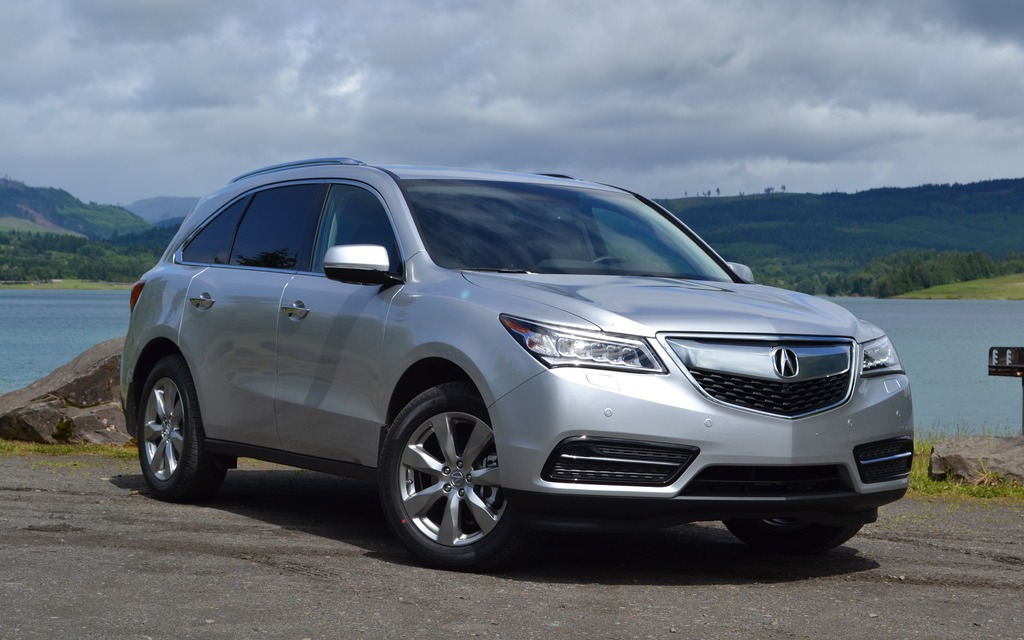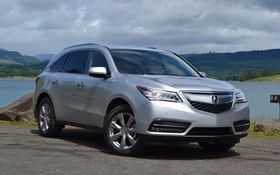2014 Acura MDX: Deep-Tissue Makeover

| Strong points |
|
|---|---|
| Weak points |
|
The Acura MDX has gotten its share of recognition in its category since the first generation was introduced in 2001. It owes its enduring popularity to its excellent style, reasonable price and its seven-passenger capacity, a first at the time. 2014 is bringing the third generation of the model, which is now hanging its hopes on soundproofing, weight reduction and, of course, fuel economy.
Honda isn’t known for being particularly bold in vehicle development, and its luxury division, Acura, is no exception. And that goes double for the most popular models, since no one wants to ruin the recipe, so to speak. So, it’s no surprise that the new MDX arriving this year doesn’t feature any radical style changes, especially considering that this model generates the highest volume of sales at Acura. The MDX, the manufacturer’s largest SUV, bucks the current trend toward more and more compact SUVs.
Be that as it may, the 2014 MDX has undergone many more significant changes than you’d think at first glance, particularly with regard to its mechanical components. In fact, very few elements remain from the last generation. Its new platform allowed Acura engineers correct several of the previous generation’s shortcomings and served as starting point to reduce the vehicle’s weight. Thanks to the use of lighter components, the 2014 MDX weighs 131 kilos less than the previous version.
A new engine, less power
While the competition quite often offers a complete choice of engines – including diesels – Acura has opted to equip the MDX with a new engine, which is probably this year’s most significant change. Gone is the old 3.7-litre 300-hp V6 in favour of the 3.5-litre fuel injection V6 taken from the Acura RLX. This engine features 290 horsepower for a torque of 267 lbs-ft. A gold star goes to any of you who noticed that this engine is 10 horses less powerful than the old V6. The torque is slightly lower as well. When you know that the competition’s V6 engines are practically all above 300 horsepower – 333 in the case of the Audi Q7 – you’ve got to wonder how Acura can turn this change to its advantage.
The answer is simpler than you think: fuel economy. In the current climate, this issue is no small matter. This engine is technologically superior to the old V6, and the loss of power is offset, for the most part, by the vehicle’s reduced weight. The missing horses have no ill effects on its handling or performance. With fuel consumption projected to be 11.2 L/100 km (highway), it seems to have struck the right balance. As you might imagine, these figures make the 2014 MDX the category leader when it comes to fuel economy. At the end of the day, it’s a matter of taste: if your priority is raw power, go with the competition; if your priority is fuel economy, the MDX may be right for you.
More sophisticated lines
Style-wise, the MDX is rounder, especially at the back. The lines resemble those of the CR-V, in particular its roofline and backward-plunging side windows. The front end has a little more of a classic style with a square hood. Looking for the key to what the 2014 MDX is all about? Look no further than the headlights. Known as “Jewel Eye,” they are made up of five LED lights placed side by side. It gives it a very sophisticated look while improving lighting at night. If you want flashy colours, you’ll have to look elsewhere. The palette of colours available for the MDX is very classic, thank you very much. Basically, the vehicle design has evolved nicely, and it projects a much more stylish appearance than before.
Inside, the dashboard features handmade real wood trim for the first time. Normally, I’m not very fond of this type of trim, but I have to admit that it’s measured, discrete and very nice in the MDX. The central part of the dash integrates two screens: the one located in the upper section displays information from the on-board computer and navigation system; the second, a located a little lower, makes using the various systems (audio, air conditioning, etc.) easier because it’s a touch screen. This is a big improvement compared to the clutter of the old generation’s dashboard. It has gone from 41 buttons to only nine!
The Elite version includes an entertainment system whose immense display screen in the back can project from two different sources simultaneously. Your kids will definitely appreciate it. Meanwhile, the cargo space behind the third-row bench has been maximized to fit bigger items.
On the road
Once you hit the road, you’ll quickly notice the attention paid to the soundproofing. The vehicle blocks nearly all the ambient noise, leaving the passenger compartment ultra silent. Several technologies were used, including thicker glass, active noise cancellation and a new suspension design.
The new engine generates enough power for the average mortal. It delivers power instantly and allows for relatively dynamic passing. However, you’ll have to plan your passes ahead of time when the vehicle is more heavily loaded. Speaking of which, the MDX can tow up to 5,000 lbs., which is similar to the competition’s towing capacity. At 7,700 lbs., the Mercedes-Benz ML leads the pack.
This 3.5-litre V6 is paired with the same six-speed automatic transmission as in the past. It has simply been optimized a tad, specifically its performance in manual mode. It still gets the job done. One of the MDX’s strengths is without a doubt its SHW all-wheel drive, which maximizes vehicle performance in all conditions. This system reacts to different driving situations by varying the engine torque distribution between the front and rear axles, then between the wheels of the rear axle.
This new generation will definitely help ensure that the MDX remains one of the manufacturer’s most popular models, especially considering that its base price is now some $3,000 less.
Compare the MDX to its competitors:
http://www.guideautoweb.com/en/specifications/compare/10850,8249,8268,9192,8159/











